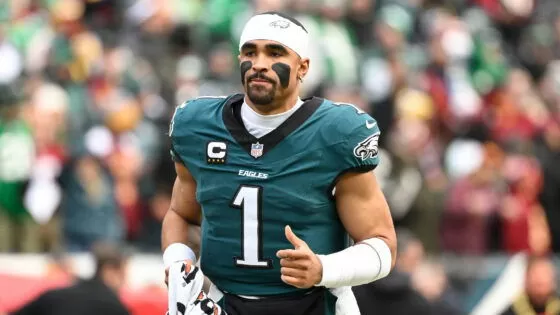Jalen Hurts has quickly become a household name in the world of American football. From his explosive plays on the field to his humble demeanor off the field, Hurts has captured the hearts of fans across the country. But it’s not just his athletic prowess that has people talking – it’s his number, No. 1, and what it represents for the city of Philadelphia.
For Hurts, No. 1 isn’t just a number on his jersey, it’s a statement. It’s a reminder of who he is as a player and as a person – a leader, a winner, and a constant source of inspiration for those around him.
But this statement didn’t come easily. It was earned through hard work, determination, and sacrifice. And now, as he prepares to enter his second season with the Philadelphia Eagles, Hurts is opening up about the significance of his jersey number and the sacrifices he’s made along the way.
Growing up in Houston, Texas, Hurts was surrounded by football from a young age. His father was a coach and his older brother played, so it was only natural that Hurts would follow in their footsteps. From the very beginning, he stood out on the field with his speed, agility, and raw talent. But it wasn’t until high school that he truly began to understand the weight of his actions and the impact he could have on others.
Hurts’ high school coach, Craig Stump, saw something special in him and gave him the opportunity to wear the coveted No. 1 jersey. This wasn’t just any jersey – it was a symbol of leadership and hard work, and it was reserved for players who embodied those qualities.
From that moment on, Hurts knew he had to live up to the expectations that came with wearing No. 1. He knew he had to work twice as hard, lead by example, and never give up, no matter the circumstances. And he did just that.
In his senior year, Hurts led his high school team to an undefeated season and a state championship, all while throwing for over 2,000 yards and rushing for another 1,000. He was named Gatorade Player of the Year in Texas and earned a scholarship to play at the University of Alabama, where he continued to wear No. 1.
During his time at Alabama, Hurts faced his fair share of challenges, both on and off the field. But he never lost sight of the message behind his jersey number – to always strive for greatness and inspire those around him. He led the team to two national championship appearances and became the first true freshman quarterback to start for the Crimson Tide since 1984.
But his biggest test came in his junior year when he was benched in the national championship game. Instead of sulking or transferring to another school, Hurts chose to stay at Alabama and continue to be a leader for his team. And when his moment came, he seized it, leading the team to a comeback victory and cementing his place in college football history.
After graduating from Alabama, Hurts faced another challenge – the NFL draft. Despite being overlooked by many teams, the Philadelphia Eagles saw something special in him and drafted him in the second round. And once again, he was given the opportunity to wear No. 1, this time in the NFL.
In his rookie season with the Eagles, Hurts showed flashes of brilliance, displaying his athleticism and playmaking abilities. But it wasn’t until the final game of the season against the division rival Dallas Cowboys that he truly left his mark.
In a game that had no playoff implications, Hurts chose to play and lead his team to a victory over their biggest rival. And in a gesture of sportsmanship, he even gave his hoodie to Cowboys wide receiver CeeDee Lamb, who had expressed his admiration for Hurts’ style and swagger.
But for Hurts, it was more than just a hoodie. It was a symbol of the sacrifices he’s made throughout his career – from the long hours of training in high school to the hard work of rehabbing an injury in college. It was also a symbol of his respect for his opponent and his desire to inspire others, both on and off the field.
Hurts’ journey has been nothing short of remarkable, and he continues to inspire those around him with his dedication and leadership. He may not say much, but his actions speak volumes, and his No.

